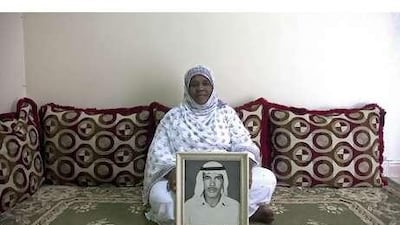RAS AL KHAIMAH // Born in Sur, the easternmost tip of Oman famed for its boat building, Obeida Salah was destined to marry a sailor. In fact, she married two.
Her first marriage, at the age of 15, lasted nine years until her husband's death. Her second marriage was also to a handsome sailor who brought her to Ras al Khaimah and the house in Maaridh she still calls home. "When I first got married I did not have a love story," said Ms Salah, 55. "Only after we got married I thought about love." Work began before marriage. Aged 10, she sewed and embroidered dresses, made three-hour hikes to a well for water and overnight treks to scavenge for wood for her family.
Five years later, she married Hamed Jamel, a sailor about twice her age, who was devoted to her. Though it has been more than 30 years since he died, the love in her voice is still clear when she speaks of him. "I did not meet him before, only after we got married," said Ms Salah. "We had a love story. He loved me, I loved him. I listened to what he said." Marriage to a mariner was not easy. Her husband was at sea for four months every year, often on the open ocean between India and Africa. Ms Salah recalls three times when ships from Sur disappeared at sea, decimating its male population.
"Everybody on board the ship[s] died," Ms Salah said. "Everybody on board was from Sur." For the women left at home waiting for their men's return, the months were long. "So many ships were coming down, wrecked in storms," Ms Salah said. "When we see [the] rain and the storm[s] come, we think too much about it. When he came back, it was the best. I was so happy. I thank God that nothing happened to him."
She recalled how her husband would rush home after months away. "When they came [back] from the sea they didn't talk about what they saw," she said. "Before people were very hard, very strong." Her husband, a smoker, died nine years after their marriage from lung cancer. Aged 24, she was left with four children. But love returned, this time in the form of a thin-moustached sailor from Ras al Khaimah.
She met Mohamd al Makiar four months after her first husband had passed away. Then in his late 30s, Mr al Makiar had married twice before but never fathered a child. An elder female relative of Ms Salah's thought this should change. The youngest of the couple's three sons and one daughter, Abdulhadi, 27, takes up the story. "When he met my mum, he was sitting in the kitchen with someone from the family talking. There was an old woman from our family and she asked my father, 'Don't you want to marry? Don't you want to see children?' My father said, 'Okay, if you have one woman I will get married.' And they shook hands."
After this quick engagement, Ms Salah was kept in a room for six days without revealing her face to a soul until her wedding, as was the tradition. Six months later, she joined her husband in RAK. "It's very hard to leave a country but he was my husband," said Ms Salah. "In my heart I didn't want to leave my country but it wasn't my choice. It was fine, I didn't have any problem. I worked in all things. I am a strong mother."
Once again she adjusted to long months away from her husband. "He built ships in RAK and set sail whenever there was an opportunity," said Ms Salah. "He did not take a rest. He was a seafarer, he went to Basra, Zanzibar, to Kuwait, Mombassa. He was also building ships for 31 years." Three years after their marriage, a few weeks after Abdulhadi was born, her husband died of a heart attack in his sleep. Ms Salah was 28. Her work as a cleaner, and support from a Sheikh Zayed charity, enabled her to remain in the house where she came as a bride in 1979.
She still lives there today with her sons, their wives and six of her 18 grandchildren. She has not remarried. Ms Salah makes regular trips to her family in Sur and returns with dozens of bowls of Omani halwa, the country's famous sweet brew of rose water, saffron and nuts. "When somebody ask me if I am from UAE, I say, 'Yes, but also I am from Oman'," Ms Salah said. "Some people," Abdulhadi said, "they don't know about their past. They think about the future but they don't see the past. We'll never forget this history. It's our family."
@Email:azacharias@thenational.ae For more in this series, visit www.thenational.ae/people

